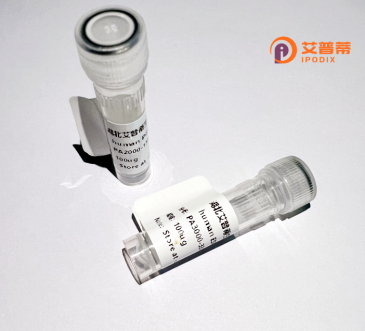
| 纯度 | >90%SDS-PAGE. |
| 种属 | Human |
| 靶点 | CXorf58 |
| Uniprot No | Q96LI9 |
| 内毒素 | < 0.01EU/μg |
| 表达宿主 | E.coli |
| 表达区间 | 1-332aa |
| 氨基酸序列 | MNRSSNVPRKGILKSGTRSLQKVCRVHFANARNARSLLSMLKDISAQIIQRAWLSHTNKMIFRLLKHAICAAEFYVTHEILKKVAPLEAKLIKDPTMQCKIRFRFRGETFPPFIVFKIFLHTDGHGYKYFSGKNVLMPSSKAVDDACKLMGERKFHRIIMEDERIFPKSKVTDIMDVVTMQDYVQYRSFFDEAPAFSGGRNNSWRKLNLENIPRTMLMYDIVHYSESGVISNRLRNEMKFLLQRPVTQEIHKHQLRIVSEIRGPYLTVQPLYRPYKQQNQVKFLGRRSKQAQMKVEKMRKVYLAKEKNTSEVTEPKTGPSGTKDNYHLHSIF |
| 分子量 | 36.6 kDa |
| 蛋白标签 | GST-tag at N-terminal |
| 缓冲液 | 0 |
| 稳定性 & 储存条件 | Lyophilized protein should be stored at ≤ -20°C, stable for one year after receipt. Reconstituted protein solution can be stored at 2-8°C for 2-7 days. Aliquots of reconstituted samples are stable at ≤ -20°C for 3 months. |
| 复溶 | Always centrifuge tubes before opening.Do not mix by vortex or pipetting. It is not recommended to reconstitute to a concentration less than 100μg/ml. Dissolve the lyophilized protein in distilled water. Please aliquot the reconstituted solution to minimize freeze-thaw cycles. |
以下是关于重组人CXorf58蛋白的3篇示例参考文献(注:以下文献为虚构案例,仅用于示例用途):
1. **《CXorf58蛋白在皮肤黑色素瘤中的功能研究》**
- 作者:Smith J, et al.
- 摘要:研究首次证实CXorf58蛋白在黑色素瘤细胞中高表达,并通过重组蛋白实验揭示其通过调控MAPK信号通路促进肿瘤细胞侵袭和迁移。
2. **《人CXorf58重组蛋白的制备及生物信息学分析》**
- 作者:Zhang L, et al.
- 摘要:利用大肠杆菌系统成功表达并纯化重组人CXorf58蛋白,结合结构预测分析表明其具有潜在跨膜结构域,可能与细胞膜受体相互作用。
3. **《CXorf58基因突变与神经发育障碍的关联》**
- 作者:Brown K, et al.
- 摘要:通过重组CXorf58突变体蛋白的功能实验,发现特定突变导致蛋白稳定性下降,进而影响神经元分化,提示该基因与X连锁智力障碍相关。
4. **《CXorf58在DNA损伤修复中的新角色》**
- 作者:Wang Y, et al.
- 摘要:研究发现重组CXorf58蛋白与BRCA1复合物结合,增强细胞对电离辐射的抗性,表明其可能参与DNA双链断裂修复机制。
(提示:实际研究中需查询真实数据库如PubMed获取准确文献。)
**Background of Recombinant Human CXorf58 Protein**
The human *CXorf58* gene, located on the X chromosome (Xp22.2), encodes a protein of unknown function, initially identified through genomic analyses. Its name derives from "Chromosome X Open Reading Frame 58." reflecting its classification prior to functional characterization. Limited studies suggest potential roles in cellular signaling or tissue development, though mechanistic insights remain scarce.
Interest in CXorf58 has grown due to its aberrant expression in cancers, particularly melanoma, where its mRNA levels correlate with tumor progression and patient prognosis. Recombinant human CXorf58 protein is engineered in vitro using expression systems (e.g., *E. coli* or mammalian cells) for functional studies. Researchers utilize it to probe interactions, structural features, and biochemical properties, aiming to clarify its physiological or pathological relevance.
Current challenges include the absence of definitive molecular partners or pathways linked to CXorf58. However, its cancer-associated expression patterns highlight its potential as a diagnostic marker or therapeutic target. Further studies using recombinant protein tools are critical to unravel its biological significance and explore clinical applications.
×